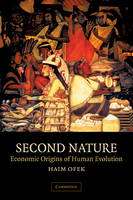
Second Nature
Economic Origins of Human Evolution
Seiten
2001
Cambridge University Press (Verlag)
978-0-521-62534-0 (ISBN)
Cambridge University Press (Verlag)
978-0-521-62534-0 (ISBN)
Was exchange an early agent of human evolution or is it merely a de novo artifact of modern civilisation? Here, Haim Ofek explores the impact of market forces on human evolution, from the feed-as-you-go strategy typical of primates to the development of agriculture and the domestication of fire.
Was exchange an early agent of human evolution or is it merely an artefact of modern civilisation? Spanning two million years of human evolution, this book explores the impact of economics on human evolution and natural history. The theory of evolution by natural selection has always relied in part on progress in areas of science outside biology. By applying economic principles at the borderlines of biology, Haim Ofek shows how some of the outstanding issues in human evolution, such as the increase in human brain size and the expansion of the environmental niche humans occupied, can be answered. He identifies distinct economic forces at work, beginning with the transition from the feed-as-you-go strategy of primates, through hunter-gathering and the domestication of fire to the development of agriculture. This highly readable book will inform and intrigue general readers and those in fields such as evolutionary biology and psychology, economics, and anthropology.
Was exchange an early agent of human evolution or is it merely an artefact of modern civilisation? Spanning two million years of human evolution, this book explores the impact of economics on human evolution and natural history. The theory of evolution by natural selection has always relied in part on progress in areas of science outside biology. By applying economic principles at the borderlines of biology, Haim Ofek shows how some of the outstanding issues in human evolution, such as the increase in human brain size and the expansion of the environmental niche humans occupied, can be answered. He identifies distinct economic forces at work, beginning with the transition from the feed-as-you-go strategy of primates, through hunter-gathering and the domestication of fire to the development of agriculture. This highly readable book will inform and intrigue general readers and those in fields such as evolutionary biology and psychology, economics, and anthropology.
Haim Ofek is Professor of Economics at Binghamton University, New York.
Acknowledgements; 1. Introduction; Part I. Bioeconomics: 2. Exchange in human and nonhuman societies; 3. Classical economics and classical Darwinism; 4. Evolutionary implications of division of labour; 5. The feeding ecology; 6. The origins of nepotistic exchange; 7. Baboon speciation versus human specialization; Part II. Paleoeconomics: 8. Departure from the feed-as-you-go strategy; 9. The origins of market exchange; 10. Domestication of fire in relation to market exchange; 11. The Upper Paleolithic and other creative explosions; 12. Transition to agriculture: the limiting factor; 13. Transition to agriculture: the facilitating factor; References; Index.
| Erscheint lt. Verlag | 25.10.2001 |
|---|---|
| Zusatzinfo | 1 Tables, unspecified; 3 Halftones, unspecified; 12 Line drawings, unspecified |
| Verlagsort | Cambridge |
| Sprache | englisch |
| Maße | 153 x 228 mm |
| Gewicht | 452 g |
| Themenwelt | Naturwissenschaften ► Biologie ► Evolution |
| Naturwissenschaften ► Biologie ► Humanbiologie | |
| ISBN-10 | 0-521-62534-3 / 0521625343 |
| ISBN-13 | 978-0-521-62534-0 / 9780521625340 |
| Zustand | Neuware |
| Haben Sie eine Frage zum Produkt? |
Mehr entdecken
aus dem Bereich
aus dem Bereich
Komplette Neuübersetzung. Mit einem Nachwort von Josef H. Reichholf.
Buch | Hardcover (2018)
Klett-Cotta (Verlag)
CHF 67,20
Wie die Vernichtung der Arten unser Überleben bedroht - Der …
Buch | Softcover (2023)
Penguin (Verlag)
CHF 20,95


